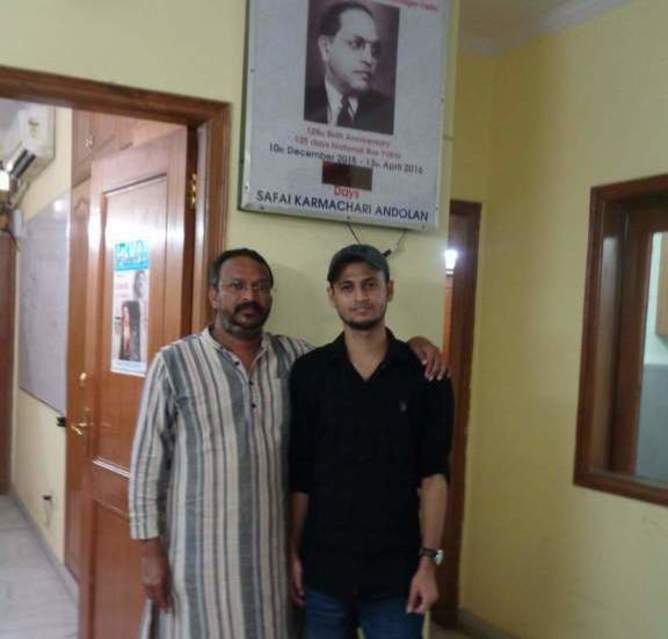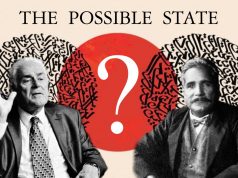[Interview]
The Magsaysay award winner and the Dalit activist, Mr. Bezwada Wilson (henceforth BW) in an exclusive interview to The Companion shared his life at school and college, and discussed his future plans with his fearless opinion on the government as well as on the bureaucrats. The Companion team congratulates you for being conferred with Ramon Magsaysay Award 2016. The interview was taken by Anwarul Hoda (henceforth AW).
AW: To begin with, tell us something about your school days. Did you have to face any kind of discrimination such as based on caste and occupation?
BW: See at many places I have told about the discrimination. This is a regular practice across the country. It is not just me, Dalits everywhere face the discrimination and it is not abnormal for the Indian society.
AW: Comment upon the challenges faced by your community at various levels right from schooling, social acceptance and employment/occupation in the light of your personal experience.
BW: There are many hurdles I faced in my early age. Particularly when I approached for any kind of employment, they used to write my name for manual scavenging. The students and colleagues also discriminated against me. I can understand how other people look me down. I face all kinds of discrimination.
AW: Moving further, can you share with us what (any particular incident?) led you to revolt against what we call societal/ socially accepted ‘manual scavenging’?
BW: Thirty years ago at my native place, I had seen scavengers or manual scavengers cleaning the toilets. That incident has made me; it is not acceptable in any human society. From that time I felt that we have to do something. It was not very systematically planned anything, whatever was possible we did, but now we realise something is going on.
AW: The Dalits have thoroughly been the victim of ascribed caste based occupations. Besides caste system, are there any other factors which cause hurdles to economic freedom of Dalits?
BW: Not just caste, even the patriarchy is another problem. Without destroying the patriarchy it is difficult for many communities to come out. And dominant caste, they don’t like to demolish or destroy anything because they enjoy the facilities, privileges and the resources. So the people like dalits and the margenalised must come together and they have to destroy the caste, the patriarchy, the class. Otherwise in India we don’t feel free or as living in a democratic country.
AW: In a survey conducted by Navsarjan in Gujarat, it was found that many people refuse to buy goods from those belonging to the Dalit community, thus forcing them to return to their ascribed occupations. What changes are required in legislature to bring reforms on cultural, occupational and social fronts?
BW: Whatever legislature we have, itself it has no capacity. There is no political will to implement. When the political will is lacking, even if you make more laws you can’t bring social change through legislation. Legislatures are one of the tools for social change. First it is for the beginning and the second is the bureaucracy must change their mindset and they must have to start implementing the laws. If they don’t implement the laws, it is like you make laws just to worship them, and we feel that we have law. What is the use of it, if it is not helping the oppressed people to come out from caste based occupation, poverty or anything? I will say making the law is one thing but, moreover, the government and the administration have to change their mindset. The ministers, the Prime Minister and the President must work rigorously. Otherwise, there is no point in making laws if they are not implemented.
At many places Dalits are not allowed to do any other work except ascribed ones but at many places they do so. The point here is that the Dalits anywhere have all the rights to choose their occupations. And to exercise that, the assertions of the Dalits are good symbol now. I always say this is not that the society must change, the government has to change the society because they are elected representatives. We cast our votes to them and we also give all powers to them. If they are unable to do so, they should apologize. Then we will find out our own way.
AW: How far, do you think, is the state responsible when it comes to providing rights to Dalits pertaining to prohibition of manual scavenging, such as enacting Dry Latrine Act and its actual implementation?
BW: See, states are not taking any step to eradicate manual scavenging. If the state has really wanted to do that, then by this time there would have been no thought of it. We would have been reading that once upon a time we had a system of manual scavenging. The problem is there is no state government or central government assuring that by this date we will eradicate it. They never show the political will to do it. The time passes but the system continues.
AW: With the recent incidents of atrocities on Dalits regarding the profession of skinning of dead cows, do you think it is an act of upper caste people to prove their dominance over them? What does it reveal about the larger plans of the RSS to strengthen their political tool (the cow) for their master plan of Hindutva?
BW: The RSS is there for their own political gains. They never change and they are never going to change. All they do is to hate somebody or create some emotions and out of that they gain. Many fundamentalist forces in this country have hypocrisy. And they don’t do like they say like ‘gau hamari mata hai’, they say that the cow is holy cow. See there is nothing like holy, everything is equal. Once you were saying Brahmin is superior and those who didn’t believe in it you killed them. Now you are saying the cow is holy and again you are killing those who don’t believe in it. This is not change, it is an extension of caste practice. They must have to understand that in a human society nobody has the right to kill anybody, the rule of law must govern everybody. ‘Your sentiments my sentiments should not rule anybody in this country’. We are living in the independent country and everybody is having sentiments. Eating beef is my sentiments, you don’t eat. If gau is your mata, it’s excellent, keep it in home and when it dies do bury it. Don’t eat beef but I am Dalit, I feel to eat. We have the practice of rearing the cows, the goats, the chickens. We have a tradition to live with animals but we don’t worship them. You can’t unnecessarily terrorize humans, it should not be like I will beat you or kill you if you will do this and this.
There are no such sentiments or concerns. If these people are so concerned, then why they are not questioning the practice of ‘manual scavenging’ which has been prohibited since 1993? Where are the sentiments? The practices related to the Dalits, the Adivasis, the minorities and the women never come to your agenda. You do only that which gives some political mileage.
There are problems like the patriarchy, the caste, and other hierarchies; we are here for social change. Let us sit together and start discussing, what is this “I will kill you”! We are living in a democratic country, there must be some dialogue.
AW: Cow has been an economically important factor for both Muslims and Dalits. What would be the economic consequences on both these communities of politicizing the Cow?
BW: On the beef export, altogether 80 percent constitutes of cow and buffalo. Out of 6 exporting companies, 4 belong to Hindu community (I am not saying these are managed by Hindus or are not managed by Muslims. No it’s not about Hindu-Muslim; I am saying they are doing their business). And from them even the ruling party BJP also got 2crores of election funds, so one way you are taking money for election benefits and in another way you say you don’t eat, so this kind of dichotomy they must stop. And if you look at the cows which are dying and smell like anything in many places that is not good for the human society. Now we all Indians must have to understand and find the ways how in respectful manner the carcasses, the dead animals, or the dead bodies should be buried instead of calling Dalits to clean them.
There are leather industries wherein there is nothing like one community is involved, I say all communities are involved, there may be minorities, the Dalits; even among Dalits there are Hindu Dalits, Muslim Dalits and so on. I am not dividing on the basis of religion like fundamentalist forces are doing. I am saying most discriminated communities are there, they are doing many things so you must recognize what they have done so far and provide an alternative kind of livelihood to them to live in a dignified manner.
AW: Why Dalits and Muslims are always the victims of Hindutva violence?
BW: Actually they both are not in the folds of Hinduism but they started co-operating here or there in certain mechanism and when it is not working out there will be conflict. There is a natural difference among the three so there will definitely be the conflicts. But if Dalits, Muslims and progressive Hindus come together, they can stop it. Making it clear, it is not like Muslims stopping Hindus or Dalits. We are making the line very clear, I am saying all discriminated communities, may be by religion, may be by language, may be by caste or by gender, they must come together and say to fundamentalist forces that you can’t dictate us, we all are together so you just keep quite.
AW: Are you satisfied with the existing reservation policies? Why Dalits are not being benefitted at a larger scale. What are the possible drawbacks of the existing policies?
BW: See reservations are only confined to government sector. There are no reservations in private sectors. So under these circumstances, among all job opportunities we have 18 percent in government jobs and within that 18 percent we only have 16 percent reservation. So it’s better to assess like in 100 percent jobs in government sector there is 18 percent reservation, and in 18 percent we have 16 percent reservation, and rest of the thing is non-reserved. So country is moving in different directions. Reservation is a kind of excuse for the people who don’t believe or not want to believe in equality. Reservation is not benefiting Dalits too much, reservation has given due shed in few places, at secretary level there are no Dalits. If the reservations work out well then there must be 16 percent Dalits while it is not. There is no reservation implemented wherever is power. There are, in schools and in colleges, professors who do all nonsense – cut marks and all. If it is really 16 percent reservation, then put it into cabinet reservation, in all first class jobs and at secretary level including joint secretary, directors. Then you say that the reservations are giving the fruits.
AW: How do you see BJP(RSS) and previous governments in uplifting Dalits regarding their rights?
BW: One thing is very clear, whatever parties they belong, mostly the Manuvadi parties have been ruling the country from the beginning and what they do is give some peanuts to the Dalits but actually when Dalits want to exercise their own rights, freedom and zeal to fight and struggle for equality they are never allowed and it is a continuous fight, and we also know that by begging we can’t get our rights so we are fighting. The only thing which is significant is that when there was congress, if people shouted, they got afraid, but now the BJP is not even getting afraid, somebody comes and gives statement. Only at one or two places they will take action and in other places they will not. If they really want to prove, they should ask Mr. VK Singh to resign, like they have to prove this because people don’t believe them. Because they always say Brahmin caste is supreme, all these we hear, so now they have to prove that by taking action one by one. Otherwise all parties are Manuvadis, that’s why they are still containing it. The reason behind the poverty, the reason behind the other problems is actually their mindset, in their mind there is no respect for equality. If they start respecting it the things will change automatically because India is not a poor country, it is a rich country. Indians are well rich so in these circumstances if there is equitable share distribution and public spaces are being equally used by everybody, then there will definitely be a chance for equal society.
AW: What do you propose as future plans for empowering Dalits?
BW: I can’t say about all Dalits but about Safai Karmchari I can say. We have waited for so many years for government to do something for us but now we are no more ready to wait, very soon we are going to release or declare our action plans, “Ap kare to kare agar nhi kare to hum chup chap nhi baithenge” . We will soon demolish the toilets to implement 1993 Act under 2013 Act. We gave sufficient time to them, now whatever changes they want to do they may and if they don’t then everybody will declare that from tomorrow nobody is going to work. We are not going to clean the shits. You find out your own way and that day is coming very soon.
(This is the transcript of the interview. You can watch the full video.)






